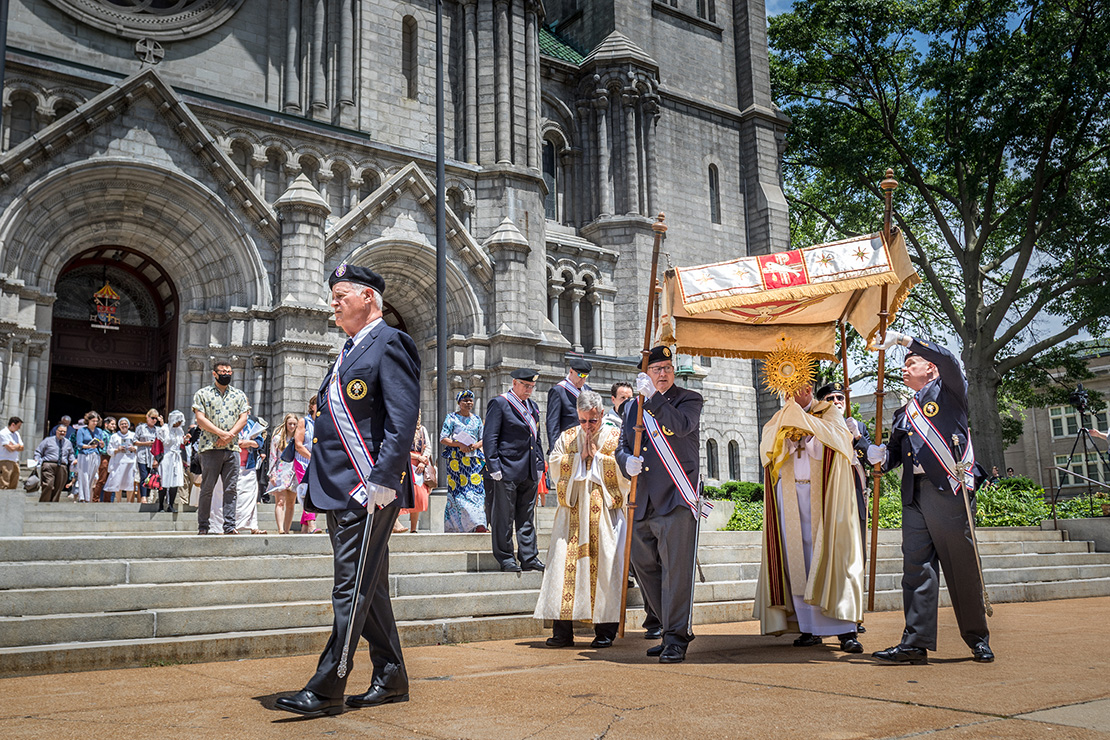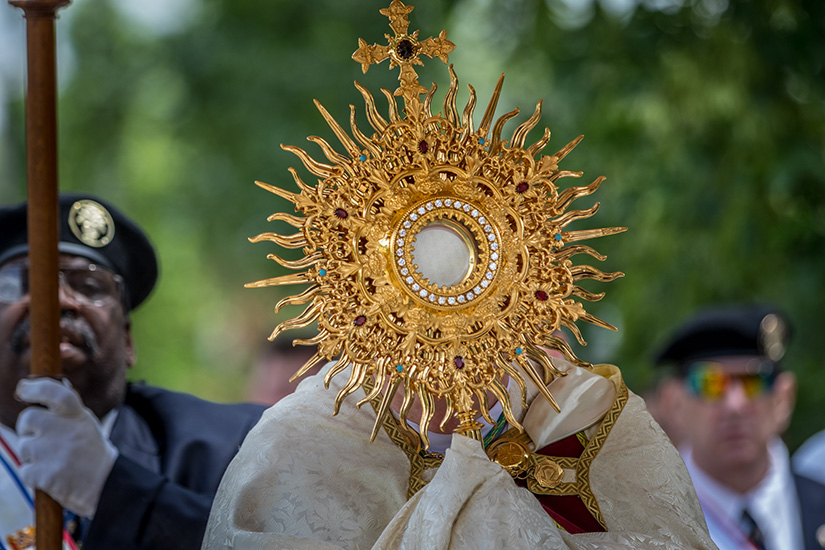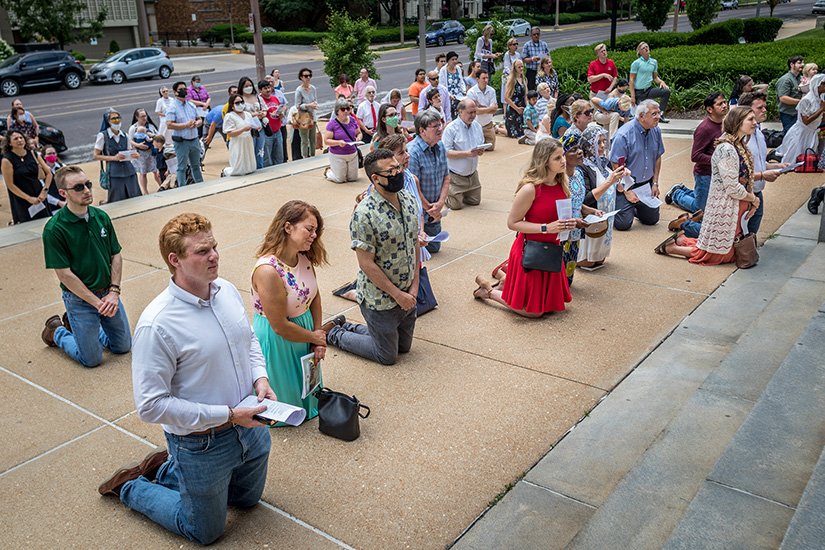 Archbishop Mitchell Rozanski processed the Blessed Sacrament on the feast of Corpus Christi at the Cathedral Basilica of Saint Louis on Sunday, June 6.Photo Credits: Lisa Johnston
Archbishop Mitchell Rozanski processed the Blessed Sacrament on the feast of Corpus Christi at the Cathedral Basilica of Saint Louis on Sunday, June 6.Photo Credits: Lisa JohnstonThe Feast of Corpus Christi, also known as the Solemnity of the Most Holy Body and Blood of Christ, observed this year on June 6, celebrates institution of the Eucharist.
The Corpus Christi procession is a centuries-old tradition of the Catholic faith to process the Real Presence of Jesus — the Eucharist — in public. The feast of Corpus Christi was established in Liege, Belgium, in 1247. Pope Urban IV extended it to the universal Church almost two decades later, and the Corpus Christi procession followed soon after. Centuries later, the tradition continues at many parishes in the Archdiocese of St. Louis, including at the Cathedral Basilica of Saint Louis.
Reflecting on the isolation that people experienced during the pandemic, Archbishop Mitchell Rozanski, in the homily at the cathedral basilica on June 6, stressed the importance of presence — especially the presence of Christ in the gifts of His Body and Blood.
“Presence is so much to us as God’s people,” he said. “God was present to us in the beginning of creation when He formed us out of the dust.” He also was present to other important biblical figures, including Abraham when God called him to be father to a nation in his older years; and Moses, who was asked to lead his people out of Egypt.
“The presence of God is a presence that shows forth the love of God in creation, in salvation, in making a covenant with his people,” he said.
 Archbishop Mitchell Rozanski processed with a monstrance containing the Blessed Sacrament on the feast of Corpus Christi at the Cathedral Basilica of Saint Louis in St. Louis, Missouri on Sunday, June 6, 2021.Photo Credits: Lisa Johnston
Archbishop Mitchell Rozanski processed with a monstrance containing the Blessed Sacrament on the feast of Corpus Christi at the Cathedral Basilica of Saint Louis in St. Louis, Missouri on Sunday, June 6, 2021.Photo Credits: Lisa JohnstonThe ultimate sealing of God’s covenant with His people came in the form of offering His only Son, Jesus, through the institution of the Eucharist, His Body and Blood.
“Offering His Body and shedding His Blood for our sake, for our salvation,” is the “ultimate covenant that could ever be made with the human race,” he said. “That is why this feast of the Body and Blood of Christ is so crucial, so important. All of our lives center around Jesus’ promise to be with us always, nourishing us here on our earthly journey so we could long for and yearn for that presence that is eternal.”
Pope Emeritus Benedict XVI called the Corpus Christi feast and procession important opportunities for Catholics to reaffirm their faith in the Real Presence of Jesus in the Eucharist.
“With awareness of being inadequate because of our sins, but needing to be nourished by the love that the Lord offers us in the Eucharistic sacrament … We renew our faith in the real presence of Christ in the Eucharist,” he said.
In his 2003 encyclical on the Eucharist, “Ecclesia de Eucharistia,” St. John Paul II wrote that “the worship of the Eucharist outside of the Mass is of inestimable value for the life of the Church. This worship is strictly linked to the celebration of the Eucharistic Sacrifice. The presence of Christ under the sacred species reserved after Mass — a
 Faithful knelt before the Blessed Sacrament on the feast of Corpus Christi outside the main entrance of the Cathedral Basilica of Saint Louis.Photo Credits: Lisa Johnston
Faithful knelt before the Blessed Sacrament on the feast of Corpus Christi outside the main entrance of the Cathedral Basilica of Saint Louis.Photo Credits: Lisa Johnstonpresence which lasts as long as the species of bread and of wine remain — derives from the celebration of the sacrifice and is directed toward communion, both sacramental and spiritual.”
Church teaching on the Eucharist
The Catholic Church professes that in the celebration of the Eucharist, bread and wine become the Body and Blood of Jesus Christ through the power of the Holy Spirit and the instrumentality of the priest. Jesus said: “I am the living bread that came down from heaven; whoever eats this bread will live forever; and the bread that I will give is my flesh for the life of the world… . For my flesh is true food, and my blood is true drink” (Jn 6:51-55). The whole Christ is truly present, body, blood, soul, and divinity, under the appearances of bread and wine — the glorified Christ who rose from the dead after dying for our sins. This is what the Church means when she speaks of the “Real Presence” of Christ in the Eucharist.
“By the consecration, the transubstantiation of the bread and wine into the Body and Blood of Christ is brought about. Under the consecrated species of bread and wine Christ himself, living and glorious, is present in a true, real, and substantial manner: His Body and His Blood, with His soul and His divinity” (CCC 1413).
“The Catholic Church has always offered and still offers to the sacrament of the Eucharist the cult of adoration, not only during Mass, but also outside of it, reserving the consecrated hosts with the utmost care, exposing them to the solemn veneration of the faithful, and carrying them in procession” (CCC 1378).
Source: United States Conference of Catholic Bishops
Read more: Archbishop Mitchell Rozanski to end dispensation from obligation to attend Mass